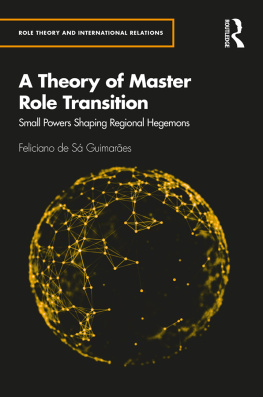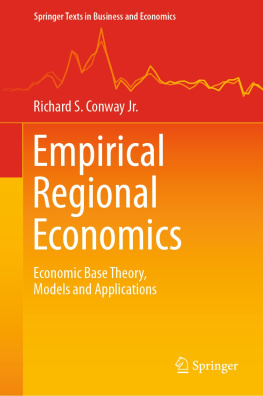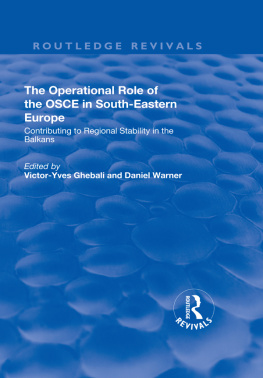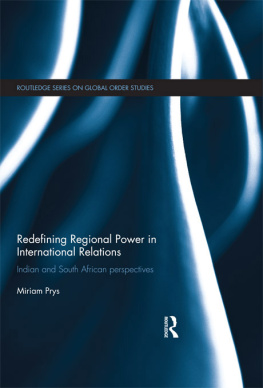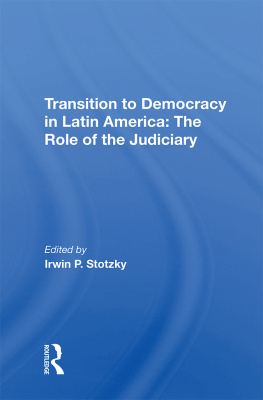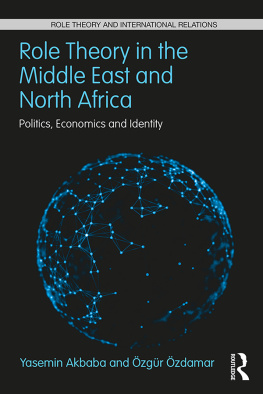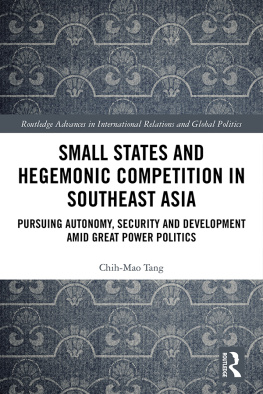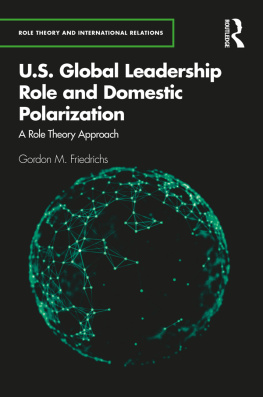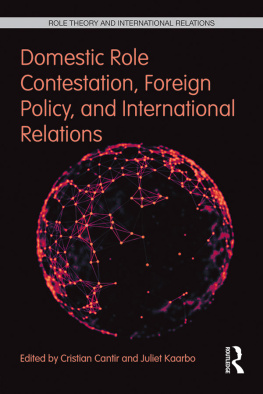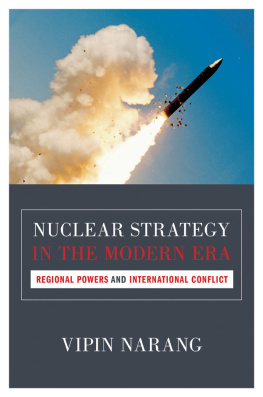A Theory of Master Role Transition
In this book, Feliciano de S Guimares offers an original application of Role Theory. He proposes a theory of master role transitions to explain how small powers can change regional powers master roles without changing the regional material power distribution.
Master role transition is the replacement of an active dominant master role by a dormant or inactive role located within ones role repertoire. Guimares argues that only a combination of four necessary conditions can produce a full master role transition: asymmetrical material interdependence, altercasting, domestic contestation and regional contestation. In each one of these conditions, a small power uses material and ideational tools to promote a master role transition within the regional power role repertoire. To test his model, Guimares turns to five case studies in Latin America, Southern Africa and South Asia: the 20062007 BoliviaBrazil gas crisis, the 20082009 ParaguayBrazil Itaip Dam crisis, the 20082009 EcuadorBrazil Odebrecht crisis, the 1998 South AfricaLesotho military intervention crisis and the 1996 IndiaBangladesh Ganges water crisis.
A Theory of Master Role Transition is an excellent resource for those studying both theory and method in International Relations and foreign policy analysis.
Feliciano de S Guimares is Associate Professor at the Institute of International Relations at University of So Paulo and Visiting Fellow at the Political Science Department at Yale University (20192020). He earned his PhD in political science from the University of So Paulo (20062010). His main topics of interest are Role Theory, public opinion and Brazilian foreign policy.
Role Theory and International Relations
Edited by Cameron G. Thies
Arizona State University
and Juliet Kaarbo
University of Edinburgh
The Role Theory and International Relations Series aspires to attract and publish the latest and best research integrating knowledge in the field of International Relations with role theory. This aspiration cuts across a wide swath of subfields, including foreign policy analysis, peace and security studies, international political economy, diplomatic studies, and international organization. While each of these subfields of study is presently organized as an island of theory, this series intends to integrate their signature phenomena within a system of knowledge, a theory complex or an alliance among different subfields. This series showcases the ability of Role Theory to generate useful theoretical insights on its own or in combination with existing theories across these traditional subfields. Role Theorys conceptual repertoire, plus its ability to span multiple levels of analyses and the major meta-theoretical divides in the discipline position it to be an important integrative force in the study of International Relations.
Domestic Role Contestation, Foreign Policy, and International Relations
Edited by Cristian Cantir and Juliet Kaarbo
Role Theory and Role Conflict in U.S.-Iran Relations
Enemies of Our Own Making
Akan Malici and Stephen G. Walker
South Korean Identity and Global Foreign Policy
Dream of Autonomy
Patrick Flamm
Role Theory in the Middle East and North Africa
Politics, Economics and Identity
Yasemin Akbaba and zgr zdamar
A Theory of Master Role Transition
Small Powers Shaping Regional Hegemons
Feliciano de S Guimares
A Theory of Master Role Transition
Small Powers Shaping Regional Hegemons
Feliciano de S Guimares
First published 2021
by Routledge
52 Vanderbilt Avenue, New York, NY 10017
and by Routledge
2 Park Square, Milton Park, Abingdon, Oxon, OX14 4RN
Routledge is an imprint of the Taylor & Francis Group, an informa business
2021 Taylor & Francis
The right of Feliciano de S Guimares to be identified as author of this work has been asserted by him in accordance with sections 77 and 78 of the Copyright, Designs and Patents Act 1988.
All rights reserved. No part of this book may be reprinted or reproduced or utilised in any form or by any electronic, mechanical, or other means, now known or hereafter invented, including photocopying and recording, or in any information storage or retrieval system, without permission in writing from the publishers.
Trademark notice: Product or corporate names may be trademarks or registered trademarks, and are used only for identification and explanation without intent to infringe.
Library of Congress Cataloging-in-Publication Data
A catalog record for this book has been requested
ISBN: 978-0-367-89774-1 (hbk)
ISBN: 978-1-003-02106-3 (ebk)
Typeset in Times New Roman
by Apex CoVantage, LLC
To Terea, Benjamin, Olivia and Cecilia.
Contents
by Leslie E. Wehner
Guide
I am grateful to many colleagues for assistance in writing this book. I am in debt to my three undergrad advisees who helped me organize most of the empirical data for the case studies: Joo Vitor Guimares Barbosa (History/FFLCH), Thiago Ferreira Vieira (IRI) and Clara Biondo de Arajo (History/FFLCH). I am also in debt to my former advisee Martin Egon Maitino (IRI), who developed with me the first version of the theoretical approach that I expanded and improved in this manuscript. My special thanks go to Cameron Thies (Arizona State University) and Marijke Breuning (University of North Texas), who recommended transforming my original draft into a book to be eventually submitted to the Role Theory and International Relations Series edited by Routledge. I also would like to thank Rafael Villa (University of So Paulo), Karina Mariano (State University of So Paulo), Tullo Vigevani (State University of So Paulo), Maria Antonieta Lins (University of So Paulo) and Paolo Ricci (University of So Paulo) for their indelible contributions to the first version of this manuscript. I presented the first version as my thesis for the title of associate professor at the Institute of International Relations at the University of So Paulo in August 2018. Lastly, I would like to thank the two anonymous reviewers from the Role Theory and International Relations Series at Routledge, whose comments greatly improved my conceptual analysis.
Generous financial support was given by FAPESP (Fundao de Amparo Pesquisa do Estado de So PauloProcesso 2017/071254), by the University of So Paulo Research Provost (Programa Unificado de Bolsas) and by CNPQ (Conselho Nacional de Desenvolvimento Cientfico e TecnolgicoProcesso 454211/20171). I am also grateful to the Institute of International Relations at the University of So Paulo for allowing me to spend my 20192020 sabbatical year as a visiting fellow in the Political Science Department at Yale University, where I could finish the manuscript; and to Nuno Monteiro (Yale University) for accepting me as tutor. The arguments presented here are partially drawn from my article written with my colleague Martin Maitino, Socializing Brazil Into Regional Leadership: The 2006 Bolivian Gas Crisis and the Role of Small Powers in Promoting Master Roles Transitions, published by Foreign Policy Analysis, Volume 15, Issue 1, January 2019 (with permission by Oxford University Press).
I dedicate this book to my family: Terea, Benjamin, Olivia and Cecilia.

